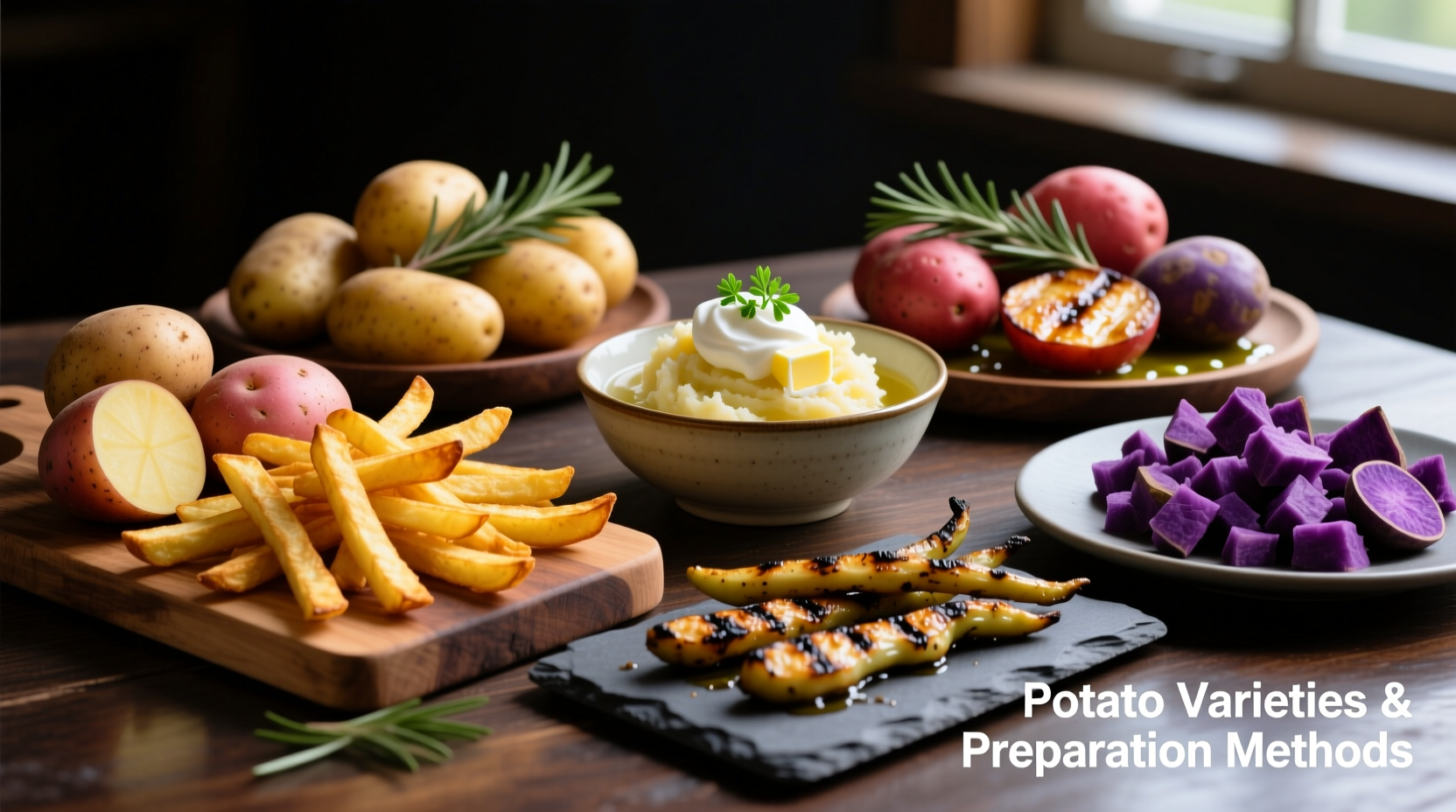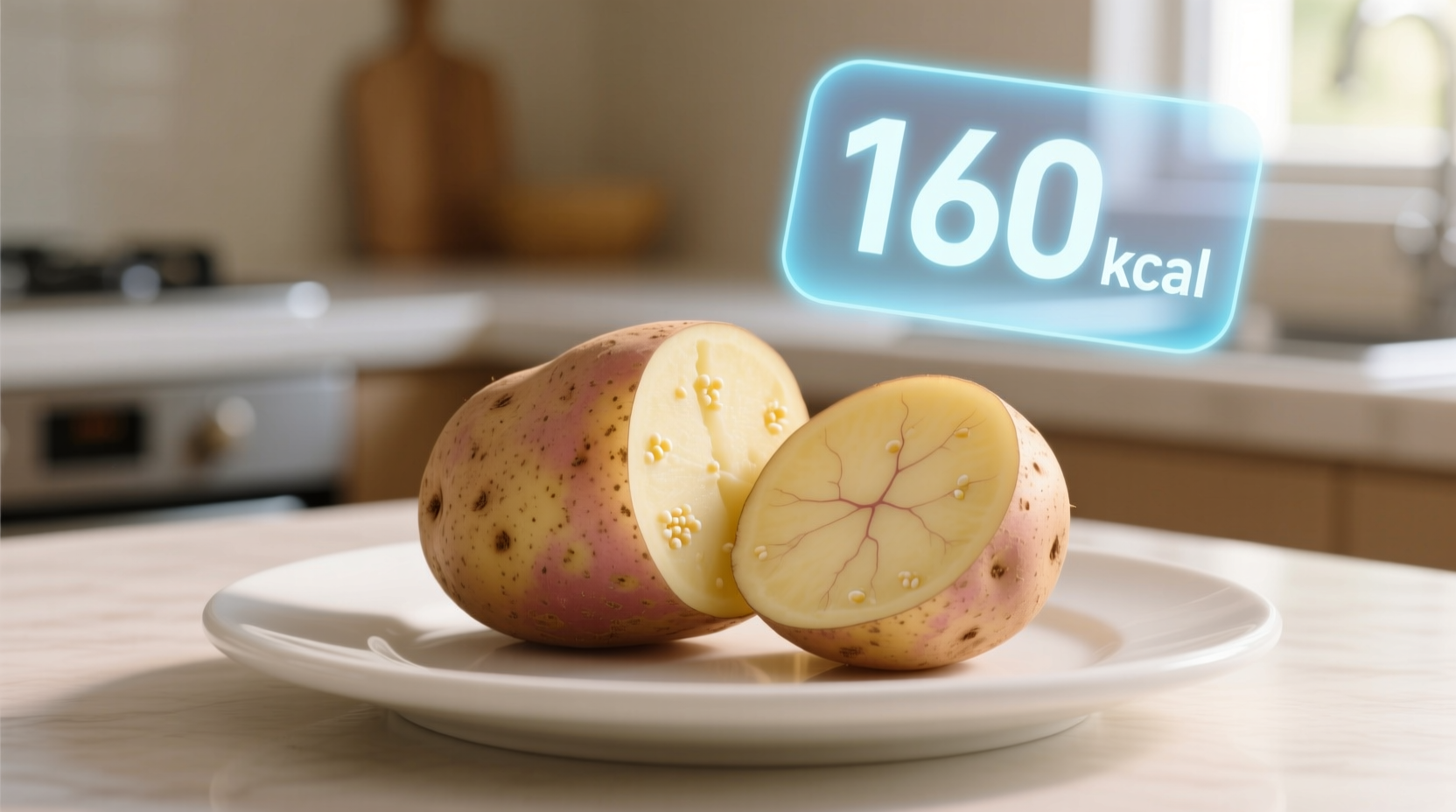A medium-sized potato (about 150g or 5.3 ounces) contains approximately 110-130 calories when boiled or baked without added fats. This calorie count varies based on preparation method, potato variety, and serving size—with fried potatoes containing up to 365 calories per serving and sweet potatoes offering a slightly different nutritional profile.
Understanding potato calories is essential for making informed dietary choices without unnecessarily eliminating this nutrient-dense food from your meals. Whether you're managing weight, tracking macros, or simply curious about nutrition, knowing the facts helps you enjoy potatoes as part of a balanced diet.
What Determines Potato Calorie Content?
The calorie count in potatoes isn't fixed—it depends on several key factors that many people overlook. Let's break down what actually affects the numbers you see on nutrition labels and apps.
Potato Size Matters More Than You Think
When nutritionists talk about "one potato," they're usually referring to a specific weight, not the whole vegetable you pull from the ground. The USDA standardizes measurements by weight rather than count because potatoes vary dramatically in size:
| Potato Size | Weight | Calories (Boiled) | Carbohydrates |
|---|---|---|---|
| Small | 138g | 100 | 22g |
| Medium | 156g | 110 | 26g |
| Large | 259g | 180 | 42g |
| Extra Large | 368g | 250 | 59g |
Data source: USDA FoodData Central
How Preparation Method Changes Calorie Count
The way you prepare potatoes dramatically affects their nutritional profile. Many people don't realize that the cooking method can more than triple the calorie content of what starts as a relatively low-calorie vegetable.

Plain Potatoes: The Baseline
When prepared without added fats, potatoes remain a relatively low-calorie food:
- Boiled potato: 110 calories per medium potato (156g)
- Baked potato: 120 calories per medium potato (173g)
- Steamed potato: 105 calories per medium potato
Fried Potatoes: The Calorie Spike
Frying introduces significant additional calories through oil absorption:
- French fries (medium serving): 365 calories
- Hash browns: 193 calories per 100g
- Home fries: 150 calories per 100g
The difference comes down to oil absorption—potatoes can absorb 8-10% of their weight in oil during frying, adding approximately 70-90 calories per tablespoon of oil used.
Nutritional Benefits Beyond Calories
Focusing solely on calories misses the bigger picture of potatoes' nutritional value. A medium potato provides:
- 45% of your daily vitamin C needs
- 26% of your daily potassium requirements
- 2g of fiber (8% of daily needs)
- Significant amounts of vitamin B6 and manganese
According to research from the Harvard T.H. Chan School of Public Health, potatoes contain resistant starch when cooled after cooking, which acts as a prebiotic fiber supporting gut health. Their analysis shows this resistant starch content increases by up to 50% when potatoes are cooked and then cooled.
Potatoes in Weight Management: Setting the Record Straight
Despite common misconceptions, potatoes aren't inherently fattening. The key is understanding portion control and preparation methods. A landmark study published in the Journal of the Academy of Nutrition and Dietetics tracked participants consuming potatoes as part of a balanced diet and found no negative impact on weight management when portion sizes were controlled.
Smart Swaps for Healthier Potato Dishes
You don't need to eliminate potatoes to maintain your calorie goals. Try these simple modifications:
- Replace sour cream with Greek yogurt (saves 50 calories per 2 tablespoons)
- Use herbs and spices instead of butter (saves 100+ calories)
- Keep the skin on for extra fiber (adds 2g fiber per medium potato)
- Try roasting with minimal oil using an air fryer (reduces oil absorption by 70-80%)
Comparing Potato Varieties: Russet vs Sweet Potato
Many people wonder whether sweet potatoes are significantly healthier than regular potatoes. Here's how they compare per 100g serving:
| Nutrient | Russet Potato | Sweet Potato |
|---|---|---|
| Calories | 79 | 86 |
| Carbohydrates | 18g | 20g |
| Fiber | 2.1g | 3g |
| Vitamin A | 0% DV | 283% DV |
| Vitamin C | 12% DV | 25% DV |
| Glycemic Index | 78-85 | 44-61 |
Source: USDA FoodData Central
While sweet potatoes contain more vitamin A and have a lower glycemic index, both varieties offer valuable nutrients. The American Diabetes Association recommends both can be part of a diabetes-friendly diet when portion sizes are controlled and preparation methods are healthy.
Practical Tips for Including Potatoes in Your Diet
Based on current dietary guidelines from the Dietary Guidelines for Americans 2020-2025, here's how to enjoy potatoes while maintaining your health goals:
Portion Guidance
One serving of starchy vegetables like potatoes equals:
- 1 small potato (about 138g)
- ½ cup of mashed potatoes
- 1 cup of diced potatoes
Timing Your Potato Consumption
Research suggests when you eat potatoes matters as much as how much you eat. Consuming potatoes earlier in the day aligns better with natural insulin sensitivity patterns. A study in the Nutrition Journal found participants who ate starchy vegetables at lunch rather than dinner experienced better blood sugar control throughout the day.
Healthy Preparation Methods
These cooking techniques maximize nutrition while minimizing unnecessary calories:
- Steam instead of boil to preserve water-soluble vitamins
- Cool cooked potatoes to increase resistant starch content
- Roast with minimal oil using cooking spray for even distribution
- Combine with protein to balance blood sugar response
Common Misconceptions About Potato Nutrition
Let's address some persistent myths that may be preventing you from enjoying this nutritious vegetable:
"Potatoes are just empty calories"
False. Potatoes contain significant amounts of potassium, vitamin C, and fiber—nutrients many Americans lack. A medium potato provides more potassium than a banana and meets nearly half your daily vitamin C needs.
"All potatoes spike blood sugar"
While potatoes do have a higher glycemic index than some foods, their actual impact on blood sugar depends on preparation, portion size, and what you eat them with. Cooling potatoes after cooking lowers their glycemic impact by creating resistant starch.
"Sweet potatoes are always healthier"
Both varieties offer unique benefits. Russet potatoes provide more potassium, while sweet potatoes offer more vitamin A. Neither is categorically "better" – the best choice depends on your specific nutritional needs and how you prepare them.











 浙公网安备
33010002000092号
浙公网安备
33010002000092号 浙B2-20120091-4
浙B2-20120091-4